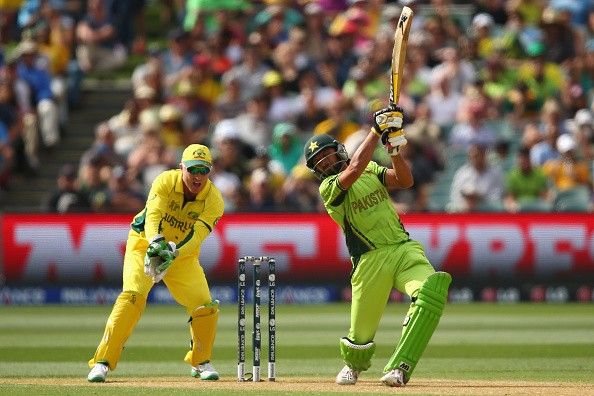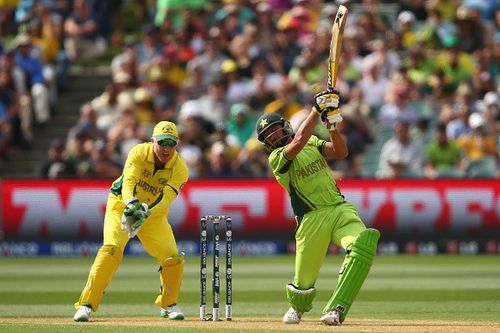
Shahid Afridi - A mercurial maverick of Pakistan Cricket

Shahid Afridi is one cricketer who fascinates and frustrates in equal measure. His brand of cricket is capricious but coruscating, erratic but enthralling, rickety but riveting. Be it with bat or ball, consistency has never been his forte but he is the shining example of the fact that in the limited-overs cricket, match-winning exploits are not necessarily the corollary of cast-iron consistency.
It is an eloquent testimony to his match-winning prowess that he has bagged the maximum number of Man-of-the-Match awards by any Pakistani cricketer in the ODIs (32) as well as in the T20 Internationals (9).
His meagre average as a batsman in the ODIs is a mirage that camouflages both his phenomenal potential and creditable contribution. There are a string of matches which he has won single-handedly, often from hopeless situations. Be it his 36-ball hundred against Sri Lanka at Nairobi in 1996, his 45-ball ton vs India at Kanpur in 2005, or his unbeaten 108 off 92 balls vs New Zealand at Sharjah in 2002, he pummelled the opposition teams to smithereens when on song.
Consistently winning matches for Pakistan
In the latter part of his career, he started batting at no.7 in the ODIs and unfurled some brutally braw innings to snatch victories from the jaws of defeat for his team.
His innings of 76 off 55 balls vs West Indies at Guyana in 2013 came when Pakistan was reeling at 47 for 5, while he unleashed 75 off 65 balls vs Sri Lanka at Sharjah in 2011 when his team was tottering at 71 for 5. In both the matches, his sparkling innings helped Pakistan reach a respectable total and later win them. As an icing on the cake, Afridi wreaked havoc with the ball too and claimed 5-wicket haul in both the matches.
These are just two of the many such examples when his late bursts brought home the baton for Pakistan.
While one can rightly carp about his disconcerting inconsistency and the fact that he often throws away his wicket playing irresponsible, sometimes daft, shots, what is beyond doubt is that he is a high-impact limited-overs cricketer, both with the bat and the ball. More often than not, his team wins the matches when he comes good.
His strike-rate in the ODIs is well above 100 which is highest by any batsman in the history of ODI cricket with over 8,000 runs.
Did Afridi the batsman fulfill his potential?
While there is nothing to write home about his batting technique, it would also be incorrect to dismiss him as a mere slogger. His Test record – 1716 runs at an average of over 36 in 27 Tests with 5 tons – is quite decent, if not excellent. His match-winning 141 vs India at Chennai in 1999 wasn’t the kind of innings a slogger can compose.
However, despite winning scores of matches, it must be stated that Afridi hasn’t fulfilled his potential as a batsman; he was capable of much better returns than what he has managed. His injudicious shot-selection and impetuosity often got the better of him leaving his team in the lurch.
His untimely retirement from the Tests saying that he isn’t cut out for Test cricket sums up his lackadaisical attitude and temperament. One gets the feeling that after a certain point of time, he started underestimating his capabilities as a batsman and bought the myth often perpetuated by media that he lacks the wherewithal to be a good batsman.
While the truth is that what he actually lacked is the sturdy temperament and self-belief.
Post 2004, he focused more on his bowling and emerged as a fine, albeit inconsistent, allrounder. Since January 1, 2004, he snapped up 264 wickets in 222 ODIs at an economy rate of 4.64. Only Lasith Malinga has snared more scalps than him in this time period in the ODIs.
Another striking fact about his record is that he grabbed 5-wicket haul 8 times in this phase – most by any bowler. On three occasions he cracked a half-century and snagged a 5-wicket haul in his ODI career; no other cricketer has attained this feat more than one time.
But perhaps the crowning glory of his cricketing career is leading Pakistan to the World T20 title in 2009 when he displayed uncharacteristic gumption and batted responsibly to smash half-centuries in semi-final (51 off 34 balls vs South Africa) as well as final (54 off 40 balls vs Sri Lanka). He was appropriately adjudged Man of the Match in both the games.
When it comes to Afridi and his performances, there is either a trickle or a torrent, there is not middle ground. Spells of drought are often followed by resonant downpours evoking frenzied hysteria among his millions of fans.
A stormy petrel on and off the field, he has been involved in a slew of controversies – announcing retirement several times & retracting, scraps with many of his team-mates, and most notably when he chewed off the cricket ball more than he could bite.
One can mock at his idiosyncrasies and his daft capers, but it is tough to dislike the man. Despite all his follies, his integrity and passion have remained unsullied in an era where many of his team-mates have been found guilty of corrupt practices like match-fixing and spot-fixing.
He talks like he bats – sometimes irksome and devoid of substance but unfailingly forthright and heart-felt. His brand of cricket symbolizes gamut of emotions – enigma, erratum, ecstasy, enterprise, and effulgence – which encapsulates the quintessence of Pakistan cricket. Perhaps that is why Shahid Khan Afridi is the biggest superstar of Pakistan.
A line from Salman Khan’s blockbuster film KICK describes his persona & cricket befittingly – ‘Dil Mein Aata Hoon, Samajh Mein Nahi.’ (I appeal to the heart, not the mind).